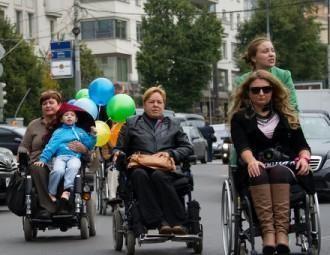Office for the rights of persons with disabilities is calling to sign the Convention with heart

The campaign aimed at joining to the voluntary initiative was launched a month ago. Any person or an organization can sign the Convention to try to follow its principles in everyday life and at work.
Earlier EuroBelarus Information Service as already reported about the initiative of the Office for the Rights of Persons with Disabilities and UN Representative Office in Belarus to run the information campaign “Sign with your heart”.
Dozens of citizens and many organizations have already signed the Memorandum on joining to voluntary commitments to follow the principles of the Convention on the rights of persons with disabilities launched a month ago in the frames of the Office’s for the rights of persons with disabilities campaign “Sign with your heart”.
Public have actively responded to the Office’s call to “sign with heart” the international document – Convention on the rights of persons with disabilities. Among the signees there are about 100 people and a dozen of different organizations including such as Belarusian Helsinki Committee, Foundation for legal transformation, Association of life-long learning and enlightenment, Belarusian Association of Journalists, Green Network, Ecodom, Agro-eco-culture and others.
– Signing of the Convention will be a very important step for Belarus at political and social levels, - says UNDP programme officer Viacheslav Shelegeiko. – UNDP supports the initiative and I am ready to “sign it with my heart”, I hope that some changes will begin on the governmental level of the country.
The principles of the Convention are shared not only by those who work in the sphere of disability. Many organizations understand that adoption of the document will help to develop a free and equal society without discrimination of some categories of social groups, including persons with disabilities. Citizens are also very actively participating in the initiative.
– You begin to understand this problem better when it concerns you or a close person. I have several wheelchair bound friends. In one case relatives were able to help: built a house, created an opportunity to move around it, move out to the yard and street. In another case a person spends all the time in his apartments. My good friend with disability successfully works as a usual office worker. I am going to sign the Memorandum and will try to provide and influence the process of assisting such people in inclusion especially in working processes in which I cooperate with them – explains the reason of his choice one of the people who signed the Memorandum Pavel Gorbunov.
A journalist Nadezhda Kalinina has also joined to the voluntary initiative.
– When I visit Europe I often see people with peculiarities of development or disabilities in streets, movies and other public places. They live a normal life and cooperate with the environment. That is why I am very upset by the fact that we, in Belarus, living in the 21st century haven’t learned yet to accept these people for who they are. Instead we try to isolate, hide… It is not normal for the modern society. The government hasn’t signed the Convention yet and it is worth to start from the society and from ourselves. That is why I signed the Memorandum.
Specialists of the Office for the rights of persons with disabilities remind that signing of the Memorandum doesn’t impose on a person or an organization some impracticable norms or obligations. Every signee chooses on his own how to follow the international document’s principles.
– At first it will be enough to read the full text of the Convention and to accept some important truths and later to try to use them in your activities. That is what our organization has done since the day of its foundation – say the Offices’ coordinator Siarhei Drazdouski. – You can tell about the Convention to your friends and colleagues and it will help to spread it and to understand it better in the future.
We remind that among the main principles one should follow there are: respect for inherent dignity, individual autonomy including the freedom to make one’s own choices, and independence of persons; non-discrimination; full and effective participation and inclusion in society; respect for difference and acceptance of persons with disabilities as part of human diversity and humanity; equality of opportunity; accessibility; equality between men and women; respect for the evolving capacities of children with disabilities and respect for the right of children with disabilities to preserve their identities.
If you haven’t signed the Convention yet it is the time to do it! You can sign it as a physical person or as an organization and try to follow the Convention’s principles in everyday life and at work.
-
03.01
-
07.10
-
22.09
-
17.08
-
12.08
-
30.09



























